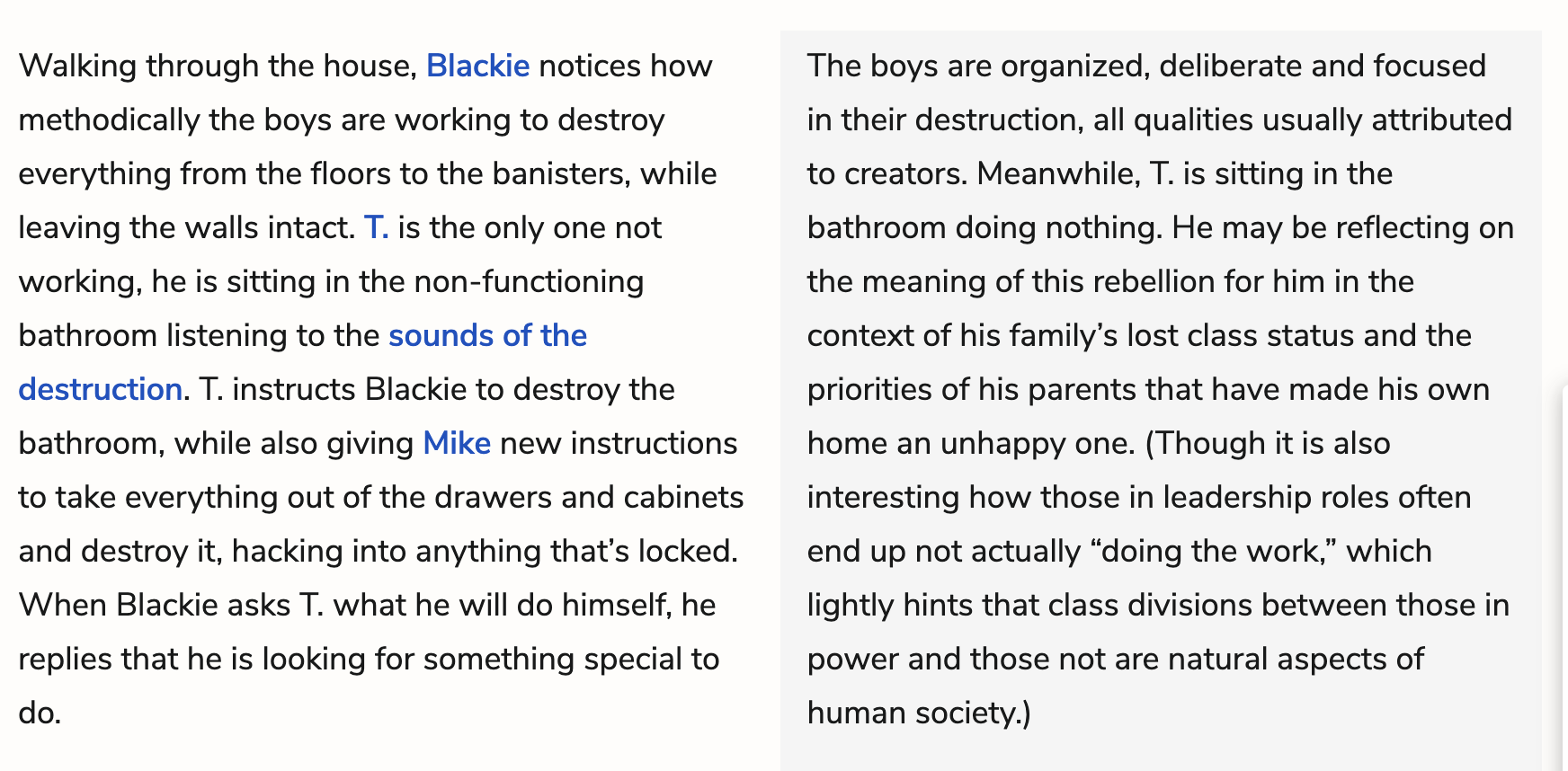As the destructors' overlords cheer
/useful orcs
I was reminded this morning of Grahm Green’s short story “The Destructors” and because I haven’t revisited it in the 50-or-so years since I first read it, I looked it up on the internet and found this analysis, certainly written by a modern literature professor. What most struck me was the professor’s sympathetic presentation of the criminal teenagers; their modern equivalent are the fascist thugs of ANTIFA, and I suspect that this professor approves of them, too.
The Destructors Graham Greene 1954
“The Destructors” is set in London, England in the early 1950s. World War II has ended less than a decade earlier, and the city and country are slowly emerging from the destruction of the war. England is not emerging unscathed or unchanged, however. The country is scarred by the deaths of hundreds of thousands of its soldiers and the destruction incurred during the unprecedented German bombing campaign on British cities. England after the war is also witnessing drastic changes to its social and political orders as a result of the war.
Before the massive upheaval of the two World Wars, England’s social hierarchy was extremely rigid. The upper classes were held to be superior, and class was inherited, making it unusual for those lower on the social ladder to move up. At the time when the story is set, the chaos and destruction of the war have reduced the fortunes of many in the upper and upper middle class, while also allowing for greater mobility among those in the lower classes.
The boys in the Wormsley Common Gang do not remember the class world that existed before the war, but they seek to fight against any return to outdated assumptions about the superiority of the upper classes and place their faith in the survival of the new, more meritocratic society then emerging. This stance on the old class order is reflected in the inner workings of the gang, and especially in the way the gang determines the hierarchy among its members. For instance, when the gang learns that the new recruit’s name is Trevor, they recognize this name as one that is only given either to members of the upper class or the ambitious upper middle class eager to be accepted among members of the true upper class. Because they have no respect for these class norms, the boys know that calling T. by his full name is a surefire way to undermine him.
Resentment towards the idea of upper class superiority also helps to motivate the boys in their destruction of Mr. Thomas’s house. T.’s father tells him that Mr. Thomas’s house was designed by Christopher Wren, an architect who lived from 1632 until 1723 and built palaces for the royal family as well as the landmark St. Paul’s Cathedral. This pedigree makes Mr. Thomas’s house a relic of the pre-war era, when class distinctions were of huge importance, and it makes the boys’ destruction of the house a symbolic strike against that old social order.
Yet the story is not simply a tale of how a rough new social order is sweeping away an older, more genteel one. Indeed, the story deliberately portrays that old order as obsolete and ridiculous, as deserving to be wiped away, despite some sadness that goes along with that destruction. At the end of the story, when the lorry driver, who is clearly a member of the lower class, cannot help but laugh at the destruction of Old Misery’s home, we see that glee at the destruction of the old class order is not only an adolescent emotion, but shared by adults as well.
Mr. Thomas’s professional history shows that he comes from a time when a different, more rigid class order reigned. Mr. Thomas has the training of a decorator and builder, so he can take care of most parts of his house, but does not know how to fix the plumbing. Plumbers were drawn from a lower class than builders and decorators, and so this lack of practical knowledge is a sign of Mr. Thomas’s class pretensions. The fact that he refuses to spend money to fix his indoor plumbing and must, therefore, use an outdoor lavatory symbolizes all the concrete disadvantages that pretensions to being above manual labor has brought members of the upper class, along with the financial failure that has left him to pinch and scrimp. When the boys lock Mr. Thomas in his lavatory, it is the final sign that his ineffectual worldview has brought about his downfall.
One day, T. surprises everyone by arriving late to the lot. Blackie interrogates T. about where he has been and it slowly comes out that T. has visited Old Misery and toured around the old man’s home. At first it seems to Blackie that this is unbefitting for a member of the gang, especially because T. describes the home as “beautiful.” But T. reveals that he has planned a prank that will surpass all the gang’s past exploits in daring: he wants to destroy Old Misery’s house while the old man is out of town for the three-day weekend. Blackie raises objections to this plan, but the gang puts T.’s idea to a vote and decides to carry it out.
“[I]t is interesting how those in leadership roles often end up not actually ‘‘doing the work’, which lightly [sic] hints that class divisions between those in power and those [who are] not are natural aspects of human society.” Interesting, but not something the professor feels compelled to elaborate on.
Blackie is hurt at first to see that T. has replaced him as the leader of the gang, but realizes the exploit would burnish the gang’s reputation around London. He decides to support T. Meanwhile T., who is suddenly imbued with confidence and leadership skill, instructs the boys to bring tools for the destruction, and they promise to meet the next day. When Blackie arrives the next day, he can hear the destruction already going on inside. Walking through the house, he notices how methodically the boys are destroying everything from the floors to the banisters, while leaving the walls intact. T. is sitting and listening to the sounds of destruction. He instructs Blackie to smash up the bathroom and says that he is looking for something special to do.
…
As Old Misery approaches his house, a boy runs up to him and tells him another boy is trapped in the outdoor lavatory. Mr. Thomas is indignant that the boys have broken onto his property, but he hears the yells of the boy supposedly locked in the toilet and allows himself to be hurried along by T., even climbing over his own garden wall.
When Mr. Thomas opens the lavatory door to free the boy, he finds himself pushed into the lavatory, with the door is locked behind him. He pleads to be set free, but the boy tells him to keep quiet. …. The boys finish by hacking away at the walls of the house until the structure balances on just a thin strip of mortar. Next they tie the wooden struts supporting the house to the back of a truck parked in the lot. T. brings Mr. Thomas a blanket and some sandwiches, telling him they don’t want him to be uncomfortable overnight, but also adding, much to Mr. Thomas’s confusion, that Mr. Thomas would no longer be comfortable in his house.
Early the next morning, the lorry driver comes to get his truck. As he pulls out of the lot, he feels something tugging on the back fender. Then there is enormous crash and debris rains down. He hears Mr. Thomas yelling from within the lavatory and frees him. Mr. Thomas cries out when he sees that his house has been torn down, but the lorry driver can’t stop himself from laughing at the spectacle.
….
T. said he could not wait to see Mr. Thomas’s face when he saw his destroyed house, and so the lorry driver serves as a kind of stand-in for T. in this scene. The driver says his laughter “isn’t personal,” suggesting that he shares the sentiments of T., who claimed not to hate Mr. Thomas or want to be cruel to him. What he laughs at is the destruction of a house that resembles a man in a top hat and represents to him the rigid class structure of England’s past. This shows that the driver, and adults in general who belonged to the formerly “lower classes,” also feel themselves to be a part of a group with a code that will help them to reshape their world in the wake of the destruction of the war. It is funny to see the old fall, if you can imagine creating the new in its place. (bolding added)
It’s easier to forgive Greene for writing this paean to an imagined new world based on socialism than it is the professor, who has had a half-century to learn what Greene’s vision has actually produced. Greene was born in 1904, he’d watched Britain’s entire social structure crumple during WWI, and the Empire dissolve after the carnage of WWII. Greene had a dream of building something from the wreckage; our modern destructors care only about tearing down what exists, with no particular idea of what they want to build in its place. Certainly it’s not a society where merit is rewarded — they have none — and individual freedom of thought is allowed.
I don’t believe that we’re currently being controlled by a single, all-powerful individual, yet, but we certainly have an oligarchy at work, an oligarchy of Saurons, perhaps, and they’ve unleashed the orcs on us villeins.





